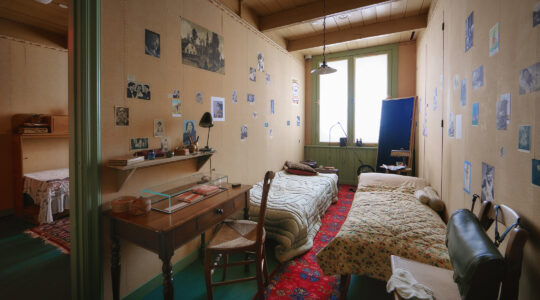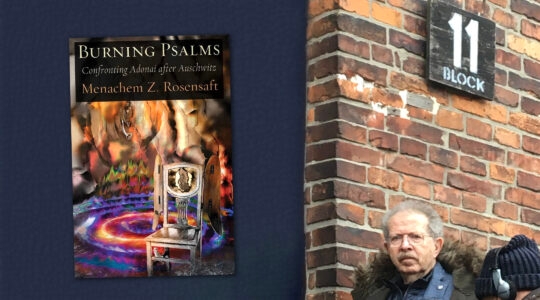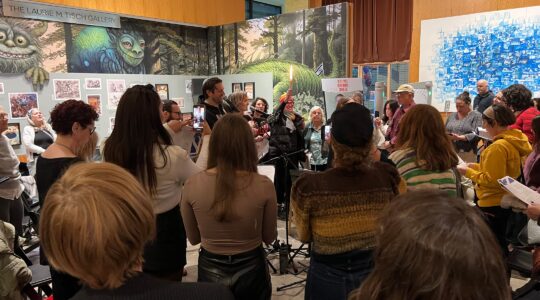A Torah ark that was created for Holocaust survivors in Germany after World War II, then traveled to a synagogue and Jewish museum in Brooklyn, will go on auction here next week.
Where will the arc of the ark take it next?
The 8-foot-tall, wooden ark, built in 1946 by the U.S. Army’s Corps of Engineers at the Displaced Persons camp in Krumbach, in the Bavarian region, will go on sale on Thursday, Sept. 19 at the Fifth Avenue Synagogue on the Upper East Side. The Aron Kodesh (Hebrew for a Torah ark) will be among 10 lots offered by Guernsey’s auction house.
Nine of the lots have a Jewish connection, including letters written by artist Marc Chagall, and items owned by or signed by such early Israeli leaders as David Ben-Gurion and Moshe Dayan, as well as a rare recording by civil rights leader Martin Luther King Jr. of a speech he delivered at Charleston County Hall the year before he was assassinated.
Guernsey’s calls the sale “Humanity and Inhumanity,” linking the Shoah and the civil rights movement, but for the Jewish community, the Krumbach Torah Ark is clearly the star of the auction.
The ark — reminiscent of the 500 sets of the Talmud published by the U.S. Army in Heidelberg in 1948 to foster a Jewish revival among Holocaust survivors — is the only-such known one created under Army auspices in Europe after World War II.
“As a cabinet, it’s worthless,” said Arlan Ettinger, president of Guernsey’s. As a piece of Jewish history, he said, it’s priceless. His firm lists the ark’s bidding price at $1 million to $2 million.
The Corps of Engineers made the ark at the suggestion of Rabbi Menachem Mendel Rubin, an Auschwitz survivor who was interred at the Krumbach DP camp, where he established a yeshiva and synagogue. When the rabbi immigrated to the United States a few years later with his wife, Chana, and some other DP camp internees, he received permission from the army to take the ark with him on the SS Marine Flasher.
Settling in Brooklyn’s Flatbush neighborhood, he founded a synagogue, Congregation and Yeshiva Yeshurun, which housed the ark until the building expanded; a new ark was installed, and the Krumbach ark was stored in a leaky garage.
Then Rabbi Rubin in 2002 gave the ark to Rabbi Shaul Shimon Deutsch, founder of the Living Torah Museum in nearby Borough Park. Though the museum presents all eras of Jewish history, it has concentrated on early periods of Jewish history, but Rabbi Deutsch recognized the relic’s value as an educational tool, showing it to visitors, mostly school groups.
Rabbi Deutsch, who invited Ettinger to the museum six months ago, showed the ark to the auctioneer, who experienced “an ‘aha moment.’”
“Why would soldiers build a Torah ark?” he wondered. Told the story by the rabbi, who needed to raise funds for his museum and for a nondenominational food pantry he also runs, Ettinger saw the ark’s value as an auction item. “I was prepared to make a one-item auction,” he said.
Then, by “purely coincidence,” the early Israeli items and Rev. King tape came his way.
Ettinger guessed that the Krumbach ark will be bought by a Jewish museum or Holocaust institution. “It’s not going to be in someone’s basement,” he said.
Holocaust expert Michael Berenbaum called the ark a symbol both of Jewish resilience after the Holocaust, and of the “American experience” of respect for minority religious and ethnic groups.
Will Rabbi Deutsch miss having the Krumbach ark in his museum’s possession?
Yes, he said. “It isn’t easy for me to part with.” But, he said, the money its sale will raise will go to a greater purpose — supporting his educational and humanitarian activities. It is worth the loss, he said, “if even one person will be helped.”
For information about the auction, or about viewing hours: (212) 794-2280; auctions@guernsey.com.
The New York Jewish Week brings you the stories behind the headlines, keeping you connected to Jewish life in New York. Help sustain the reporting you trust by donating today.




